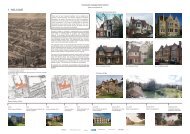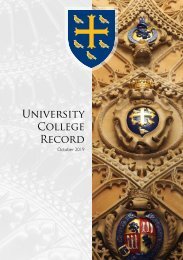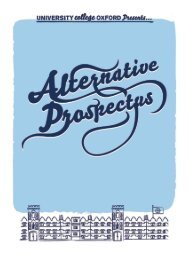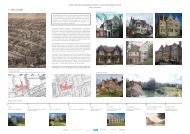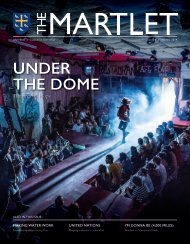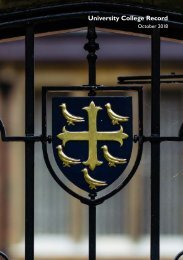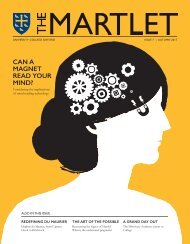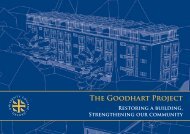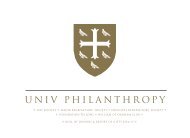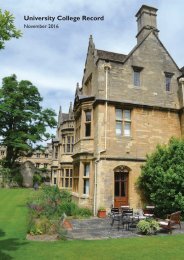You also want an ePaper? Increase the reach of your titles
YUMPU automatically turns print PDFs into web optimized ePapers that Google loves.
From the Chaplain<br />
Old Members are always welcome at all services in chapel,<br />
not just at the Advent Carol Services, and there have been<br />
a number of occasions this year when they have helped to<br />
lead out worship. Two took place at Old Members’ events:<br />
at our 1966 Golden Reunion Weekend, when the Revd<br />
Robert Bracegirdle (<strong>Univ</strong> 1966) preached in the course of<br />
term time Sunday worship, and at our 2007-2009 Gaudy<br />
when former choir members sang. Others took place in<br />
the course of Choral Evensong during term. One was<br />
our annual service of thanksgiving for our Founder and<br />
Benefactors, when the Revd Dr Janet Williams (<strong>Univ</strong><br />
1979) was our preacher, and a second was a special service<br />
of Choral Evensong in May when former and current members of the chapel choir<br />
combined forces and compared notes about their respective experiences of life at <strong>Univ</strong>.<br />
The text that follows is an abbreviated version of the Chaplain’s sermon this occasion,<br />
and retains some the style of a piece that was written to be spoken rather than read.<br />
Not all of us who are here would identify ourselves as people of Christian faith, or<br />
of any religious faith whatsoever. For sometimes it is music, not religious commitment<br />
or belief, that is the common ground that allows so many people to come together in<br />
a context like Choral Evensong in a college chapel, to make or to appreciate music of<br />
the highest standard that we can. No musician or choir member, whether a person of<br />
faith or not, wants to perform or to sing any less well than he or she can. And no one<br />
who worships God wants to give any less than their best, whatever that might mean in<br />
the circumstances or context in which they find themselves. So that gives us a common<br />
purpose, whether or not we confess a common faith. And it is why the Church has long<br />
been a patron of music and other art, and why musicians and other artists have long<br />
found a valued place in the Church regardless of what they might, or might not, believe.<br />
For some of us, music contributes to an experience that we may describe in terms of an<br />
encounter with God, the transcendent, or the divine. For others, the explanation may not<br />
be theological, but expressed in terms of an aesthetic experience, or an encounter with<br />
something sublime. But for all of us, music may play an important and transformative<br />
part in our lives. One that takes us beyond ourselves, and helps us to feel part of a greater<br />
whole.<br />
But what is it about Evensong in particular, whether here or elsewhere, that might<br />
draw us to it? One of its strengths, from a musical perspective, is that the core of the<br />
service is very short. You can say it in 20 minutes, or sing it in 35, so the short core of<br />
the service allows lots of music to be added, without distorting its form. ‘Its script, as it<br />
were,’ writes one historian of church music, ‘is light enough in weight to permit plenty of<br />
musical embellishment without a sense of disproportion’. To put it rather crudely, you can<br />
pack a lot of music in without making the service too long or unwieldy. Or, in a college<br />
context, without making anyone late for dinner.<br />
Closely tied to this is the balance between familiarity and change. The structure<br />
or script is quite simple, so we can get to know it and inhabit it in a way that becomes<br />
natural and relaxed. A way that means that we don’t need always to be thinking about<br />
34<br />
what happens next. But the music to which familiar words are set is always changing, as<br />
are the words of the reading and the words and music of the psalm and the hymns. So<br />
within the familiar there is always scope for something that is fresh and new, yet stands<br />
within a tradition that goes back not just to the origins of Evensong in the English<br />
reformation, or even to the medieval monastic liturgies on which it draws, but back to<br />
the more ancient words of Scripture of which it is almost entirely composed. So the script<br />
allows us, through changing words and music, to focus and to reflect on different themes<br />
at different points in the year. And to reflect or express different needs and emotions and<br />
hope and fear in response to different life events and to situations as they arise.<br />
Tonight, for example, the theme that runs through our texts is the theme of Jerusalem,<br />
whether as historical site, contemporary city, or heavenly vision. And it does so in a way<br />
that invites us to look beyond ourselves, and through the bubble in which it is so easy<br />
to live here in Oxford, to the reality of the world beyond, as well as to what Christians<br />
believe to be the reality beyond this world itself.<br />
Some of us may have seen images of the Archbishop of Canterbury and the Chief<br />
Rabbi praying together earlier this month at the Western Wall in Jerusalem. It was an<br />
image of hope, in a divided city, and a divided world. But in addressing the press, and<br />
the public, neither leader minced his words about the ways in which religious divisions<br />
have played a terrible part in human history, even as they work to overcome them today.<br />
Jerusalem is a city that has known and still knows violence and conflict on a scale that we<br />
may struggle to imagine, and Choral Evensong invites us to reflect on that. Not to ignore<br />
it, but to bring it in to the heart of our worship and therefore of our lives.<br />
For some of us, simply being reminded of the different lives of others may be all<br />
the motivation that we need to act. And I know that many of us here, and many of our<br />
friends, give our time as volunteers or advocates for causes that we believe in, and that we<br />
give our money too. But if we are people of faith, that gives us further reasons to work<br />
for the common good. Because of gratitude for all that we believe that God has done for<br />
us, and because of the vision of the new Jerusalem, coming down to earth, when God’s<br />
will is done here as it is in heaven. When all people of all nations will see and know the<br />
reality of God’s presence and light and rest in our lives.<br />
Choral Evensong, to quote another historian of church music, is ‘a kind of emotionally<br />
rich theatrical spectacle’. Like musical theatre elsewhere, it can help us to empathise with<br />
other people whose lives may be very different from our own, and to understand better<br />
who we are ourselves. But more than that, claim Christians, it sets out to proclaim the<br />
ways of God in the world, and especially in the life, death and resurrection of Jesus<br />
Christ, his Son, our Lord. When we join in its rhythms we are invited to engage with a<br />
story that is greater than our own. To participate in a conversation that began long before<br />
we were born, and will continue long after we are gone.<br />
35<br />
Dr Andrew Gregory




